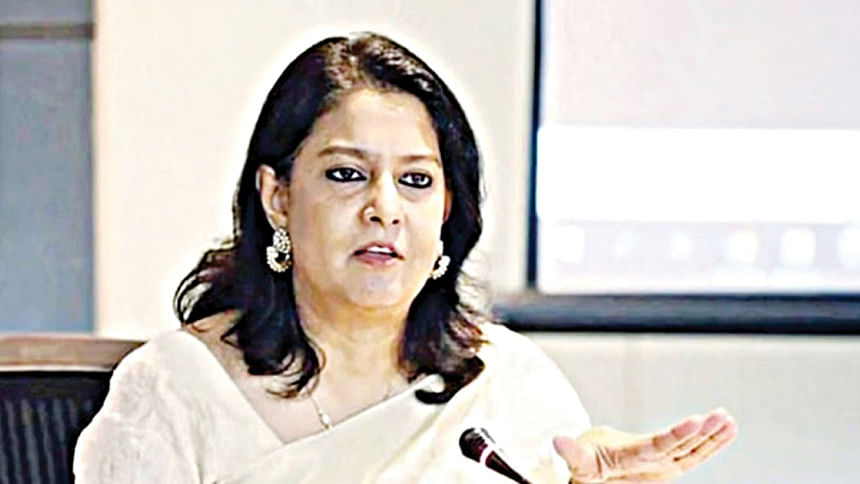No cause for panic over US tariffs

There is no reason to create unnecessary alarm over the 35 percent reciprocal tariff announced by the United States on Bangladeshi readymade garment (RMG) products, Environment, Forest and Climate Change Adviser Syeda Rizwana Hasan said yesterday.
"It is premature to draw conclusive remarks while negotiations are still ongoing. The government is prioritising national interest and engaging all stakeholders," she said at a dialogue titled "Fostering Sustainable Investment," organised by the American Chamber of Commerce in Bangladesh (AmCham) at Sheraton Dhaka.
The adviser's comment comes as business leaders have expressed concerns regarding Bangladesh's negotiation with the US administration over the tariffs, set to come into effect on August 1.
The adviser stressed that the RMG industry has survived various crises in the past, including the Rana Plaza tragedy in 2013, even though many feared those would lead to the collapse of the industry.
"Instead, due to public-private collaboration, the industry not only recovered but evolved. Today, Bangladesh has the highest number of green RMG factories globally and is advancing sustainability," she said.
However, she acknowledged that despite progress, Bangladeshi apparel still faces a 35 percent US tariff, while many competitors enjoy duty-free access.
"Even under such disadvantages, the sector remains resilient—a testament to smart policy and entrepreneurial spirit," she said.
The adviser called for "constructive, realistic dialogue" rather than panic.
Speaking on environmental sustainability, she warned that sustainable investment alone won't ensure environmental preservation unless global consumption patterns change.
"This cannot be a one-country conversation," she added. "Without global reflection, sustainability won't hold."
She cited positive developments in textiles, energy, and waste, including low-water dyeing technologies and an upcoming industrial water use policy. However, she voiced concern over the use of toxic chemicals in textiles sold locally and called for a binding chemical management framework.
Highlighting potential in textile recycling, the environment adviser urged greater policy support. She also criticised the glorification of extravagant corporate lifestyles, calling for a cultural shift.
Welcoming the Renewable Energy Policy targeting 30 percent renewables by 2030, she stressed reducing import reliance.
Lastly, she called for inclusive policies on climate justice, migration, and tobacco, and for reforming investment to protect natural resources amid rising global clothing demand.
Also speaking at the event, Forest E Cookson, former AmCham president, sought urgent planning to relocate Bangladesh's population due to rising sea levels and extreme heat caused by climate change.
He proposed building 50 new cities north of Dhaka, including at least 15 cities with the capacity to accommodate 8 million each. He also recommended shifting ministries, schools, and hospitals from Dhaka to avoid overconcentration.
Cookson also stressed the need for strong governance, housing, water, and digital infrastructure.
He called for developing a national cooling industry, led by the government and universities, to ensure livability and global export potential.
With growing electricity demand from cooling, electric vehicles, and artificial intelligence systems, he recommended prioritising nuclear energy over gas and renewables.
"The time to act is now," he said, urging a strategic shift as climate threats intensify.
AmCham President Syed Ershad Ahmed emphasised that Bangladesh must align economic growth with environmental sustainability to ensure long-term resilience.
Highlighting risks from pollution, deforestation, and unplanned urbanisation, he noted that Dhaka ranks as the world's third least livable city—a factor likely to erode investor confidence.
He called for stronger enforcement of environmental laws and urgent reform in governance.
Ahmed praised the private sector's green initiatives, including Bangladesh's leadership in LEED-certified garment factories, but cited policy delays and regulatory gaps as key barriers.
He urged enhanced public-private collaboration in renewable energy, waste innovation, and climate-smart infrastructure to make sustainability central to Bangladesh's economic future.
Fehmi Muhsin Yüksel, chief financial officer of Recover, emphasised that sustainability is now vital for textile competitiveness, urging Bangladesh to adopt a national circularity strategy.
Reza Mahmud, country manager of Philip Morris Bangladesh Ltd, highlighted that while smoking harms health and the environment, offering less harmful alternatives like e-cigarettes and heated tobacco products could contribute to public health goals.
Muhammad Imrul Kabir, director of corporate affairs at Chevron Bangladesh, highlighted Chevron's 30-year commitment to Bangladesh's economic growth and community development.
As the country's largest producer, supplying 60 percent of domestic gas, Chevron has invested $4.2 billion, including $634 million in local contracts, he added.

 For all latest news, follow The Daily Star's Google News channel.
For all latest news, follow The Daily Star's Google News channel. 



Comments